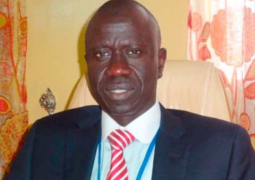Sheriff Jallow’s comments came in a recent one-on-one interview with the Information Officer at his office in Banjul on Thursday where he outlined main functions of his office as responsible for coordination and implementation of the current Civil Service Reform Programme (CSRP) – a 10-year strategic programme running from 2018-2027.
He also dilated on other topical issues relating to the welfare of civil servants.
Mr. Jallow gave a detailed explanation of CSRP 2018-27 that entailed six strategic objectives such as: enhancing optimal organisation and staffing of the public sector; attracting, retaining and motivating optimal number of civil service employees; enhancing discipline, performance and accountability of civil servants; reinforcing meritocracy with due processes and professionalism in personnel administration; as well as accelerating improvements in civil service delivery by harnessing ICT and systematically closing capacity gaps in the civil service.
He stressed that the above six CSRP strategic objectives are to be pursued between the period 2018 and 2027, while appreciating support from the Cabinet for approving the strategy, which allows the PMO to start the implementation of the programme.
Further commenting on the support received from the Cabinet for the implementation in the country, Mr. Jallow cited numerous Cabinet paper approvals on matters affecting CSRP whenever the need arises.
Director Jallow made reference to institutional reform as something paramount in the programme, adding that the CSRP has two categories such as institutional and personnel reforms.
He called on public and the civil service in particular to give maximum support to the programme for the benefit and welfare of citizenry and described the 2018-2027 reforms programme as one of the longest terms compared with other reform programmes which were short term in nature.
He justified his claim with reference to other CSRPs such as the 2008-2011, which he said were all short term programmes compared with the current one.
He noted that a country like The Gambia, not endowed with many resources, makes it all the more important to continuously strive to improve government operations for greater efficiency and effectiveness.
He assured of his office’s commitment to deliver as expected and also welcomed valuable criticisms from civil servants and the public on the implementation of CSRP 2018-2027, which is critical in helping them during the implementation process.
“It will also help us to know where we need improvement in our reform programmes and thus entail listening to the views of civil servants and the public for valuable information and feedback,” he concluded.
Read Other Articles In Headlines





